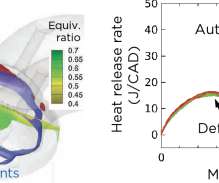Co-Optima report highlights most significant R&D achievements in FY2019
Green Car Congress
JUNE 4, 2020
Left: Simulation of spark-assisted compression ignition (SACI) engine operation with E30 (gasoline with 30% ethanol) during mixed deflagration (blue areas) and autoignition (red areas) combustion. To date, few biomass-based diesel fuel alternatives are viable for widespread commercial use and able to be produced at scale.











Let's personalize your content